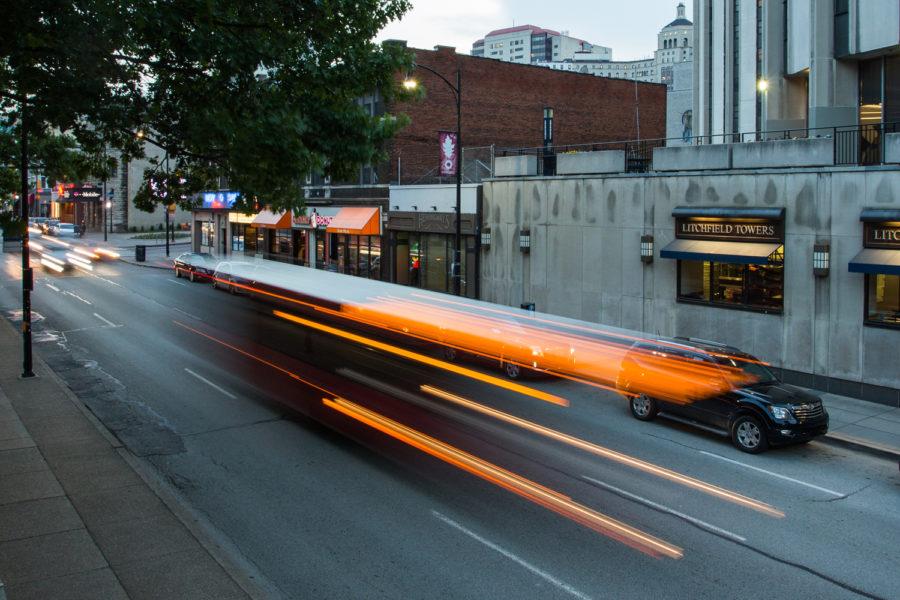With playlists and podcasts downloaded for the commute, roughly 800 undergraduate Pitt students make their daily trek to campus, whether it be from as near as Bloomfield or as far as the South Hills.
I had that long and traffic-riddled drive from the South Hills over the summer — a journey that took anywhere from a half hour to an hour and a half depending on the time of day and if there was a sports game Downtown.
But I’ve decided to move to Friendship — a neighborhood between East Liberty, Shadyside and Bloomfield — for the school year to cut down on commuting time. And although the walk to campus is roughly 45 minutes, biking takes less than 20, and a bus takes about 10.
So there are plenty of options to get to campus in a timely manner. Of course I always miss being able to roll out of bed and essentially sleepwalk to class — but saving money while getting to live in a quiet, clean neighborhood has its own set of perks.
Josh Dorn, a junior majoring in computer science, commutes to campus from Fox Chapel and reaps the financial benefits of living off campus.
“Commuting gives me the opportunity to save money during college,” Dorn said. “Since I go to school so close to home, I have the ability to drive to school every morning to minimize student loans.”
Dorn said that some of the perks of commuting are having a close group of friends who are also commuters who can hang out off campus, having the ability to focus on schoolwork during weekends when necessary and skipping out on paying Oakland’s high rent prices.
Iman Basha, a senior majoring in chemical engineering, lives in Shadyside and takes the bus to campus. Basha has been commuting to Pitt since her sophomore year and, like Dorn, said it saves her a lot of money.
“It’s way cheaper to live off campus,” Basha said. “I used to live in South O and it was just really gross. So when you’re paying for it, it’s just garbage — you’re not getting any space for what you pay for it.”
Not living on campus or in the neighborhood next-door has disadvantages — she has to be more organized and make sure she remembers to bring everything she needs for all of her classes.

“If I forget something, I’m screwed for the day,” Basha said. “I work in a lab for research, and we have to wear closed-toed shoes. So whenever I forget to wear shoes that are closed-toed, I need to go back home to get shoes and it’s just not as convenient.”
There’s another downside to living off campus, Dorn said. He feels like he is missing out on the full “college experience.”
Dorn isn’t alone. Sloane Kozyak, a junior majoring in German and political science, is a First Year Mentor — one of 19 upper-class students helping new peers adjust to Pitt. She said a disadvantage that many commuters cite is that they feel like they aren’t having a traditional college experience.
“It might seem harder to join clubs or organizations since most meet on weekday nights,” Kozyak said.
And for Dorn, joining clubs and organizations is not something he has time to do — he works part-time with Geek Squad throughout the year in addition to being a full-time student.
“To balance school and work, I take most of my classes Monday, Wednesday and Friday so that I can work a few days a week to make money during school,” Dorn said.
The little free time that Dorn does have is between classes — time he spends playing table tennis or hanging out in the Commuter Lounge in Nordy’s Place in the William Pitt Union.
“We also invite commuter students to stop into the Office of First Year Experience on the first floor of the Union to say hi to some of the First Year Mentors,” Kozyak said.
The First Year Experience Office, which includes First Year Mentors, hosts a series of programs targeted toward commuter students.
The schedule for the fall commuter programs is still in the planning stages, Kozyak said, but in the past has included a Chancellor’s picnic, a required Bystander Intervention Training and a free dinner.
Also, during Orientation Week, there is a day dedicated to commuter students — aptly named Commuter Student Day. All commuter students are required to attend three out five programs for all new students — such as Commuter Student Involvement Panel and a picnic with Chancellor Gallagher — in addition to commuter-specific programs.
The First Year Experience Office assigns commuter students to specific “Commuter Pods” based on where they are travelling to campus from, Kozyak said. Each pod has its own Facebook page where First Year Mentors promote upcoming events and have discussions with commuters.
Kozyak suggested commuter students without a meal plan pack their own lunches and organize their schedules to avoid driving in Oakland during rush hour.
“There is nothing worse than city traffic,” Kozyak said.
Not only that, but Basha said it’s in commuters’ best interest to make the fewest trips to and from campus as possible — her advice to new commuters is to think through the practicalities of commuting on a daily basis.
“When picking an apartment, you have to make sure it’s near a bus stop,” Basha said. “Make sure you’re thinking realistically about what you’re doing, like your daily activities.”
Commuter students must plan more diligently than those living on or closer to campus, but the payoff can be well worth it. Dorn said commuting is what you make of it, and that if you’re prepared, you shouldn’t have any problems.
“As long as you have a plan and stick to it, you can have all the fun of living on campus while saving money and excelling in school,” Dorn said.


